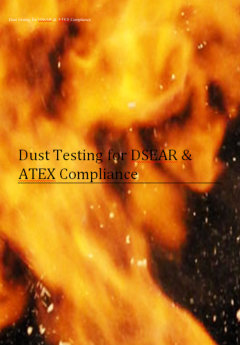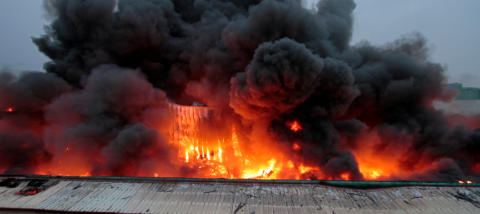Explosion Testing for dust, gases & vapours


© January 2026
DSEAR and ATEX
DSEAR implements the requirements of ATEX
137 (Directive 99/92/EC ) in the UK
Explosive atmospheres can be caused by combustible dusts mixed with air and are designated zone 20, zone 21 or zone 22 depending upon the frequency and duration of the dust cloud. If an effective source of ignition comes into contact with the explosive atmosphere, a dust explosion will result. This free 16 page guide describes the standard laboratory tests available to characterise dusts for their ignition and explosion hazard properties. It describes the tests and the parameters they measure, enabling plant engineers and system designers to make informed judgement on safety matters such as: what is safety critical information and what is simply ‘interesting to know’; whether explosion and ignition information can be reliably taken from published data; is data required for every dust and powder being handled, or can ‘worst case’ materials be identified?


- Classification test
- Explosion indices test
- 1m3 explosion test
- Minimum ignition energy
- Minimum ignition temperature
- Layer ignition temperature
- Limiting oxygen concentration
- Lower explosible limit
- Isothermal basket test
- Powder volume resistivity
- Train fire
- Thermal screen
- Air Over Layer
- UN Classification testing

Explosion Testing


© January 2026
DSEAR and ATEX
DSEAR implements the
requirements of ATEX 137
(Directive 99/92/EC ) in the
UK
Explosive atmospheres can be caused by combustible dusts mixed with air and are designated zone 20, zone 21 or zone 22 depending upon the frequency and duration of the dust cloud. If an effective source of ignition comes into contact with the explosive atmosphere, a dust explosion will result. This free 16 page guide describes the standard laboratory tests available to characterise dusts for their ignition and explosion hazard properties. It describes the tests and the parameters they measure, enabling plant engineers and system designers to make informed judgement on safety matters such as: what is safety critical information and what is simply ‘interesting to know’; whether explosion and ignition information can be reliably taken from published data; is data required for every dust and powder being handled, or can ‘worst case’ materials be identified?



















